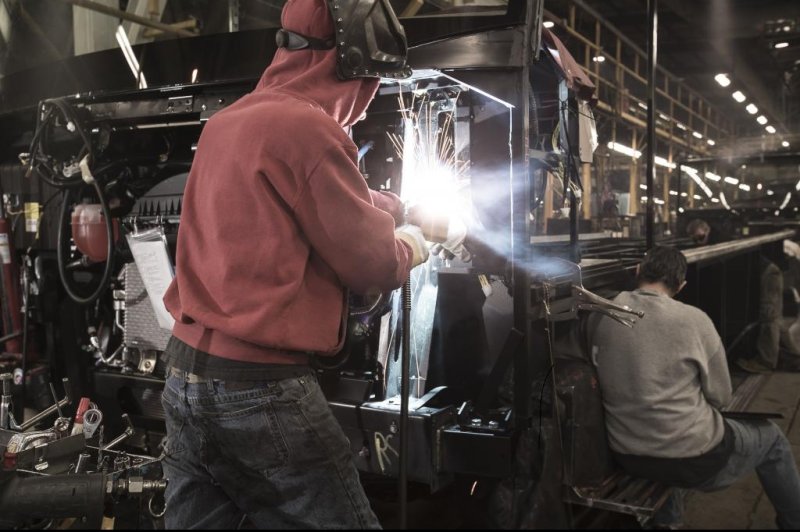A welder works on a recreational vehicle in a Winnebago factory. Photo courtesy Winnebago Industries
EVANSVILLE, Ind., Nov. 16 (UPI) -- As tariffs on steel and aluminum are costing manufacturers across the nation millions of dollars, one small community in Indiana is feeling particularly uneasy.
Elkhart County, with a population of just over 200,000, is considered the recreational vehicle capital of the world. Around 85 percent of all RVs built in the United States are manufactured in this area.
"The RV is beyond foundational to our economy," said Levon Johnson, president and CEO of the Greater Elkhart Chamber of Commerce. "When 85 percent of all RVs in the U.S. are made here, it's important."
Any blow to the RV industry will cascade through the Elkhart community, Johnson said. And the tariffs are a blow.
The price of steel rose by about 40 percent after the Trump administration placed a 25 percent tariff on steel imports in the spring, said Laura Baughman, president of the Trade Partnership, which studies the impacts of tariffs. The administration also placed a 10 percent tariff on aluminum.
The sudden price jump is hitting the RV industry hard.
Winnebago Industries, which builds towable RVs in an Elkhart County factory, told investors during its fourth-quarter earnings call that the tariffs had cost the company more than $10 million in 2018. They expect that trend to continue next year.
"We won't share specific numbers," said Michael J. Happe, Winnebago's president, CEO and director. "I would just offer that we are looking at eight figures that have hit our business in the past, will hit our business in the future."
RV companies like Winnebago are trying to to offset the price increase by changing their vehicles' designs to use less steel and aluminum. But there's only so much they can do.
"Inevitably, the price is going to go up," said Kevin Broom, a spokesman for the RV Industry Association.
That hasn't happened yet. Most RV dealers are still selling units made before the steel price spiked. Broom guesses that the post-tariff RVs will begin hitting retail floors by the end of the year.
"An RV is a discretionary purchase," Broom said. "People are usually borrowing money to do it. If the price goes up 10 percent, that's extra money every month the customer has to pay to make that purchase. They may delay buying, or decide to spend their discretionary money somewhere else."
If the tariffs remain, the result will eventually be decreased production -- and layoffs.
Many manufacturing industries are facing similar pressure. The Trade Partnership estimates that if left in place, the steel and aluminum tariffs will cost more than 430,000 people their jobs in the next one to three years.
"Our estimate includes places like restaurants and movie theaters," Baughman said. "As people in manufacturing lose their jobs, they'll stop going out to restaurants and movies."
This ripple effect would be especially pronounced in places like Elkhart County, where four of the top five employers either manufacture RVs of RV parts.
"The RV is vitally important to our economy," Johnson said. "So it's a challenge. But there are constant challenges in manufacturing, and we have bright leaders in the RV industry here who are working to face this."















